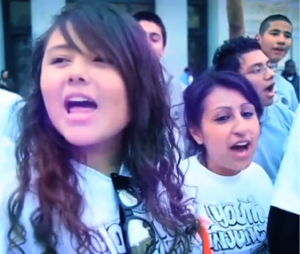67 Sueños: Help Undocumented Students Share Their Story
 When you think about the DREAM Act you think about valedictorians and soldiers and amazing people taking their cues from Horatio Alger, pulling themselves up by their bootstraps. But, as organizer Pablo Paredes told News Taco, the truth is that most undocumented students brought here as children by their parents are not extraordinary. Rather, he said, they are simply trying to get by and live their lives like everybody else — and they, too, are deserving of a path to legalization.
When you think about the DREAM Act you think about valedictorians and soldiers and amazing people taking their cues from Horatio Alger, pulling themselves up by their bootstraps. But, as organizer Pablo Paredes told News Taco, the truth is that most undocumented students brought here as children by their parents are not extraordinary. Rather, he said, they are simply trying to get by and live their lives like everybody else — and they, too, are deserving of a path to legalization.
That’s where his new project 67 Sueños (pronounced sixty-seven sueños) comes in, to help these students tell their stories and give a voice to their struggles.
The program is set to not only collect the stories of the estimated 67% of undocumented students who wouldn’t qualify for the DREAM Act, but organize advocacy around the issues that affect them personally. Our weekly segment, “Bien Hecho,” highlights the good deeds and achievements of Latinos across the U.S. If you feel that someone you know is deserving of recognition, let us know at tips@newstaco.com.
“There’s this massive amount of undocumented youth who won’t benefit from even the current language of the DREAM Act, and that’s probably even going to get more conservative,” Paredes told News Taco.
Key to current legalization paths under the DREAM Act is a high school diploma, which Paredes noted, only about 25% of undocumented youth have. He claims that about 67% of undocumented youth do not qualify at all under the current language of the DREAM Act, and 67 Sueños is meant to help them by targeting community service as a means to earn legalization.
“About 50% of undocumented youth in Oakland drop out,” Paredes told News Taco, noting that in 2000 the original DREAM Act legislation included a provision of 950 hours of community service as a path to legalization. “They have no advocacy. That’s why it’s so easy to chop them out of the DREAM Act.”
By way of example Paredes pointed to a recent interview wherein a student spoke of the terrible impact the towing of her mother’s car had on the family. Turns out this is an issue that affects many immigrants families in the area, and so the idea is to create advocacy around such issues that affect these students. Other components of the program include a video, a mural and more to come this fall. Check out this link for more information and the video below.
Follow Sara Inés Calderón on Twitter @SaraChicaD
[Screenshot And Video By New American Media]
